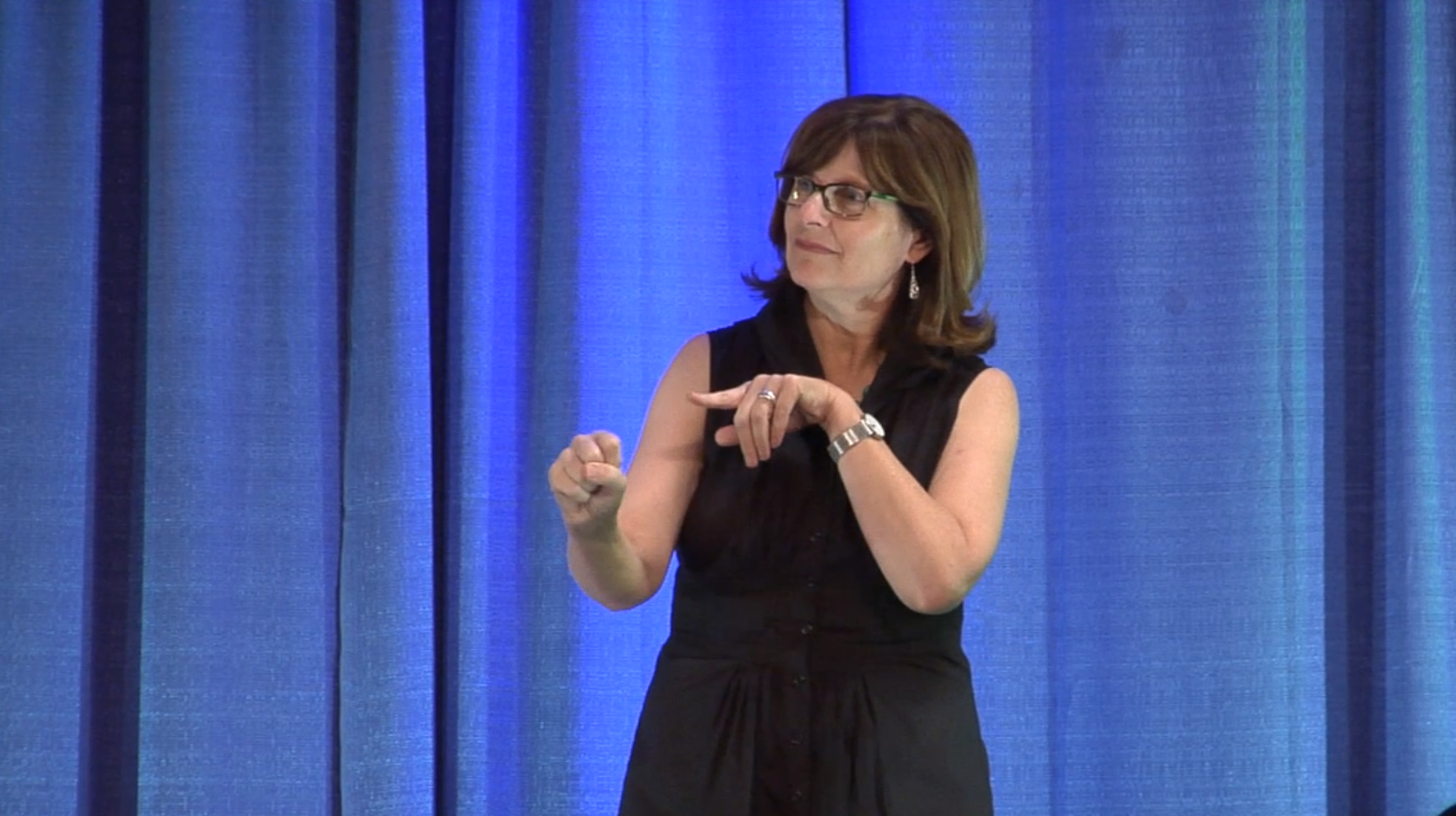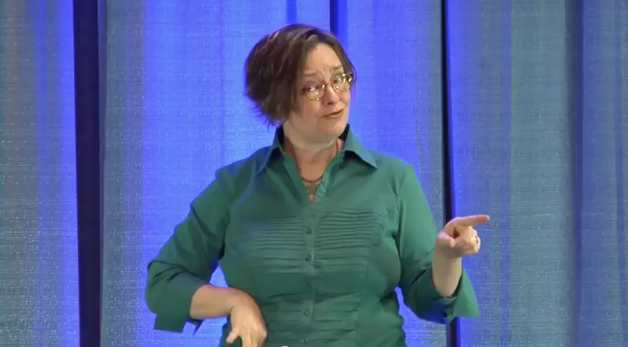
The lack of trust between the Deaf community and hearing interpreters is rooted in privilege. Examination of our own privilege is difficult but necessary work if we hope to address the impacts of that privilege on the community we exist to serve.
Recent events have shone the spotlight on the deep rift and lack of trust between the Deaf community and hearing sign language interpreters. This lack of trust is not new and the actions of the National Registry of Interpreters for the Deaf are not the sole source of this mistrust. Hearing interpreters must look at ourselves and our own behaviors to recognize that we are perpetrating our own peculiar brand of hearing privilege in our daily interactions with the Deaf community we exist to serve. Aside from obvious and egregious ethical breaches, we are often oblivious to our own hearing interpreter privilege.
Confronting Our Own Privilege
A common reaction when confronting our own privilege is to deny that we have it or that we have ever behaved in a way that capitalizes on or perpetuates this privilege. We may acknowledge the existence of privilege while denying our participation in it or that we benefit from it. Michael Eric Dyson has written a book called, Tears We Cannot Stop (Dyson, 2017) as a sermon to white people on white privilege. In a section of the book called, “The Plague of White Innocence,” he writes, “…in my insistence on holding you accountable for privilege, for tiny but terrifying aggressions, for condescension, for any of the everyday racial slights that reinforce white supremacy, I have invoked again your sense of guilt.” (Dyson, 2017, p. 102-103) Now, let’s think about this in terms of Deaf people and hearing interpreters and the “tiny but terrifying aggressions” we may perpetrate against Deaf people. When Deaf people raise issues of hearing privilege, do we exempt ourselves? Can we acknowledge the unique form of our hearing interpreter privilege?
I have been asked by Deaf consumers, “Why don’t interpreters hold each other accountable?” When we engage in polite indifference and look the other way at behavior damaging to the Deaf community, we are perpetuating interpreter privilege. We, as part of the collective community of interpreters, all too often close ranks against the Deaf community as an act of self-preservation based on privilege. So I ask you, my colleagues, why don’t we hold each other accountable?
Recognizing Power Dynamics
I’ve been told by hearing interpreters that Deaf consumers need to speak out when they experience inadequate skills or ethical abuses by interpreters. In a perfect world, this is exactly what should happen, however, it ignores the power dynamics involved. Deaf people risk a great deal in speaking out about hearing interpreters who fail to provide adequate services. They risk being labeled as ‘difficult’ by the interpreting community, making it harder to find interpreters to work with them. In spite of ethical prohibitions against divulging assignment related knowledge, it happens widely in the interpreting community under the guise of ‘information sharing.’ We justify this kind of sharing as a way to support other interpreters in making better decisions about what jobs to accept, but at what cost to the consumers who have been deemed less desirable to work with? Again, we close ranks on the community we purport to serve and employ our privileged status to do so.
Consider these additional words from Dyson, through the frame of power dynamics between interpreters and Deaf people, “We are forced to be gentle with you, which is another way of saying we are forced to lie to you. We must let you down easy, you, the powerful partner in our fraught relationship.” (Dyson, 2017, p. 96). How many of us, working, paid, professional interpreters, expect a big dose of gratitude from the Deaf consumers we work with? How many of us demand positive feedback, claiming openness and the desire to improve, and then feel aggrieved should the consumer dare to share honest feedback with us? Consider the position we put Deaf people in when we ask them for feedback. Now, in addition to trying to glean the meaning of the message through the imperfect filter we are, the consumer is also expected to be observing and noting patterns in our work, errors in sign formation, sloppy fingerspelling and erratic use of space. Is it fair to make such a request of someone who is trying to benefit from a class or a conference or a meeting at work or a medical appointment? Suppose the consumer is willing to go along with the interpreter’s request to subjugate meaning in order to observe interpreting patterns, what does s/he risk in offering honest feedback?
Look again at Dyson’s words, “We are forced to be gentle with you, which is another way of saying we are forced to lie to you. We must let you down easy, you, the powerful partner in our fraught relationship.” (Dyson, 2017, p. 96). Denying we have power does not lessen the power we have. Interpreter privilege allows us to put Deaf people in these risky positions.
The Practice of Allyship
We hearing interpreters don’t get to decide for ourselves that Deaf people can and should trust us. Trust must be earned in each encounter and we must be meticulously trustworthy in order to earn it. Over the years, I have worked with a number of hearing sign language interpreters who expect a personal relationship with the Deaf consumer from the first moment they meet. They insist on an emotional connection with someone who, in any other context would be a total stranger. In effect, they expect and demand that the Deaf person trust them on sight because they have deemed themselves as trustworthy or a friend of the Deaf community or an ‘ally.’ In her article “No More Allies,” Mia McKenzie writes,
’Ally’ cannot be a label that someone stamps onto you—or, god forbid, that you stamp on to yourself—so you can then go around claiming it as some kind of identity. It’s not an identity. It’s a practice. It’s an active thing that must be done over and over again, in the largest and smallest ways, every day. (McKenzie, 2013).
The assumptions and expectations that Deaf consumers must trust us and befriend us immediately because we see ourselves as trustworthy and demonstrating ‘Deaf heart’ reflect unearned privilege on the part of the interpreter.
We must re-earn and reaffirm that trust every day in every encounter with each Deaf consumer. It requires a lot of effort, but as Mia McKenzie says later in her article, “Sounds like a lot of work, huh? Sounds exhausting. Well, yeah, it ought to be. Because the people who experience racism, misogyny, ableism, queerphobia, transphobia, classism, etc. are exhausted. So, why shouldn’t their ‘allies’ be?” (McKenzie, 2013). Add “audism” to that list and it applies directly to our work.
How Do We Start?
Addressing the deep lack of trust between hearing interpreters and the Deaf community requires us to listen deeply to the marginalized community we are privileged to enter on a daily basis. Learning about privilege in other contexts and training that lens on our interactions with the Deaf community, we can support each other in confronting hearing interpreter privilege in order to raise the level of accountability of the entire field. Listening to Deaf people without being defensive, apologizing when called for, taking responsibility for our actions, and learning from mistakes will go far to rebuild the delicate trust necessary for hearing interpreters to work effectively with the Deaf community.
Final Thoughts
Looking at privilege is an extremely uncomfortable journey. It takes us to places that can feel shameful and painful. But it is also an opportunity to look beneath the surface of how things have always been and begin to build a better, more equitable way of being in the world. Interpreters are in a unique position, as sojourners among the Deaf community, knowledgeable about the language and culture of this historically oppressed community. We have the opportunity and the responsibility to examine our privilege and alter our thinking and our actions to truly ally ourselves with the Deaf community.
Questions for Consideration
- By virtue of being interpreters, sojourners in an oppressed language community, how are we perpetuating our own peculiar brand of interpreter privilege?
- What kinds of “tiny but terrifying aggressions” towards Deaf consumers have you witnessed/engaged in while working as an interpreter?
- How can hearing interpreters best support each other in coming to terms with the fact of our privilege in the context of our daily work?
References
Dyson, M.E. (2017) Tears We Cannot Stop. New York City: St Martin’s Press.
McKenzie, Mia (2006). No More ‘Allies’. Black Girl Dangerous. Retrieved from http://www.blackgirldangerous.com/2013/09/no-more-allies/












